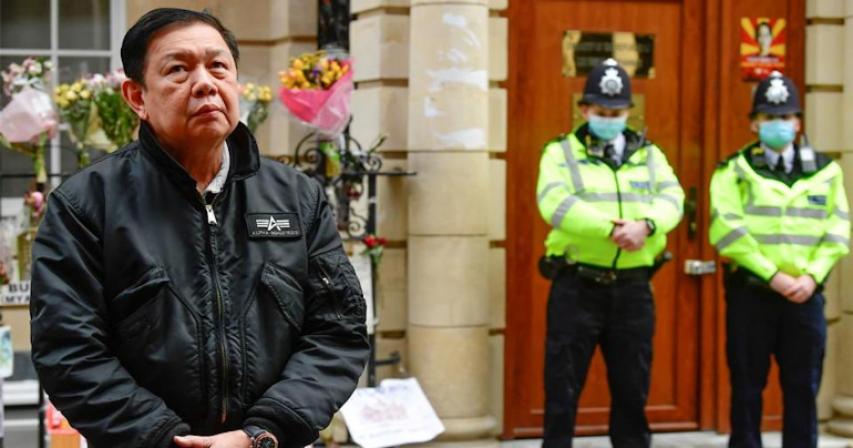Myanmar's ex-UK envoy says military attache has occupied embassy
- 4 years ago

Myanmar's ex-ambassador in London spent Wednesday night in his car after saying he was locked out of his embassy.
Kyaw Zwar Minn said staff were asked to leave the building by Myanmar's military attaché, and he was dismissed as the country's representative.
British Foreign Secretary Dominic Raab has condemned the "bullying actions," but the UK has accepted the change.
Myanmar's military seized power in a coup on 1 February, sparking protests and escalating violence.
Kyaw Zwar Minn has criticised the military coup, and called for Myanmar's ousted leader Aung San Suu Kyi to be released.
About 600 people - including dozens of children - have been killed so far as pro-democracy protesters demand a return to power of elected leader Ms Suu Kyi and her National League for Democracy (NLD) party.
Through a spokesman out the front of the embassy on Thursday morning, Kyaw Zwar Minn urged the UK government not to recognise the military junta's newly appointed ambassador, and to send them back to Myanmar.
"There was a coup in Myanmar in February. Now there is the same situation in central London," he said, adding embassy staff were being threatened with "severe punishment if they don't continue to work for the military general".
Police were reportedly called to stop staff re-entering the building. Protesters gathered outside after news spread that the ambassador had been locked out.
According to the Vienna Convention on diplomatic relations, an ambassador's job officially ends once the host country has been informed.
The Foreign Office confirmed it received the notification, and that it "must accept the decision taken by the Myanmar Government".
Deputy ambassador Chit Win is said to have taken over as chargé d'affaires in London, Reuters reported, citing diplomats with knowledge of the matter. However, the Foreign Office said it has "received no formal notification of his replacement".
A chargé d'affaires serves as the head of a diplomatic mission in the absence of an ambassador.
In March, Kyaw Zwar Minn called for the release of Ms Suu Kyi and told the BBC that Myanmar was "divided" and could be at risk of civil war.
He maintained that his remarks were not "betraying the country", adding that he was standing on "middle" ground. In response, the Myanmar government issued a statement saying he had been summoned home, but he stayed in London.
"He's trying to work in the middle ground but there is no doubt which is the right side," the spokesman for Kyaw Zwar Minn said.
It follows another day of deadly protests in Myanmar. In the northwest town of Taze, at least 11 anti-coup demonstrators were killed in clashes with security forces on Wednesday night. Local media are reporting the troops fired at protesters who fought back with hunting rifles and firebombs.
Myanmar's military seized power on 1 February after overthrowing the government and declared a state of emergency.
Just days later, a protest movement began to emerge, which quickly gained momentum, leading to hundreds of thousands of people taking part in street protests.
A popular model and actor, Paing Takhon, was arrested as part of a growing crackdown on artists and actors. The 24-year-old was active in both online protests and in-person rallies, and has millions of fans in Myanmar and Thailand.
Last week, Ms Suu Kyi was charged with breaking a colonial-era official secrets law, which carries a term of up to 14 years in prison.
Myanmar in profile
• Myanmar, also known as Burma, became independent from Britain in 1948. For much of its modern history it has been under military rule
• Restrictions began loosening from 2010 onwards, leading to free elections in 2015 and the installation of a government led by veteran opposition leader Aung San Suu Kyi the following year
• In 2017, Myanmar's army responded to attacks on police by Rohingya militants with a deadly crackdown, driving more than half a million Rohingya Muslims across the border into Bangladesh in what the UN later called a "textbook example of ethnic cleansing"
Source: BBC
Comments